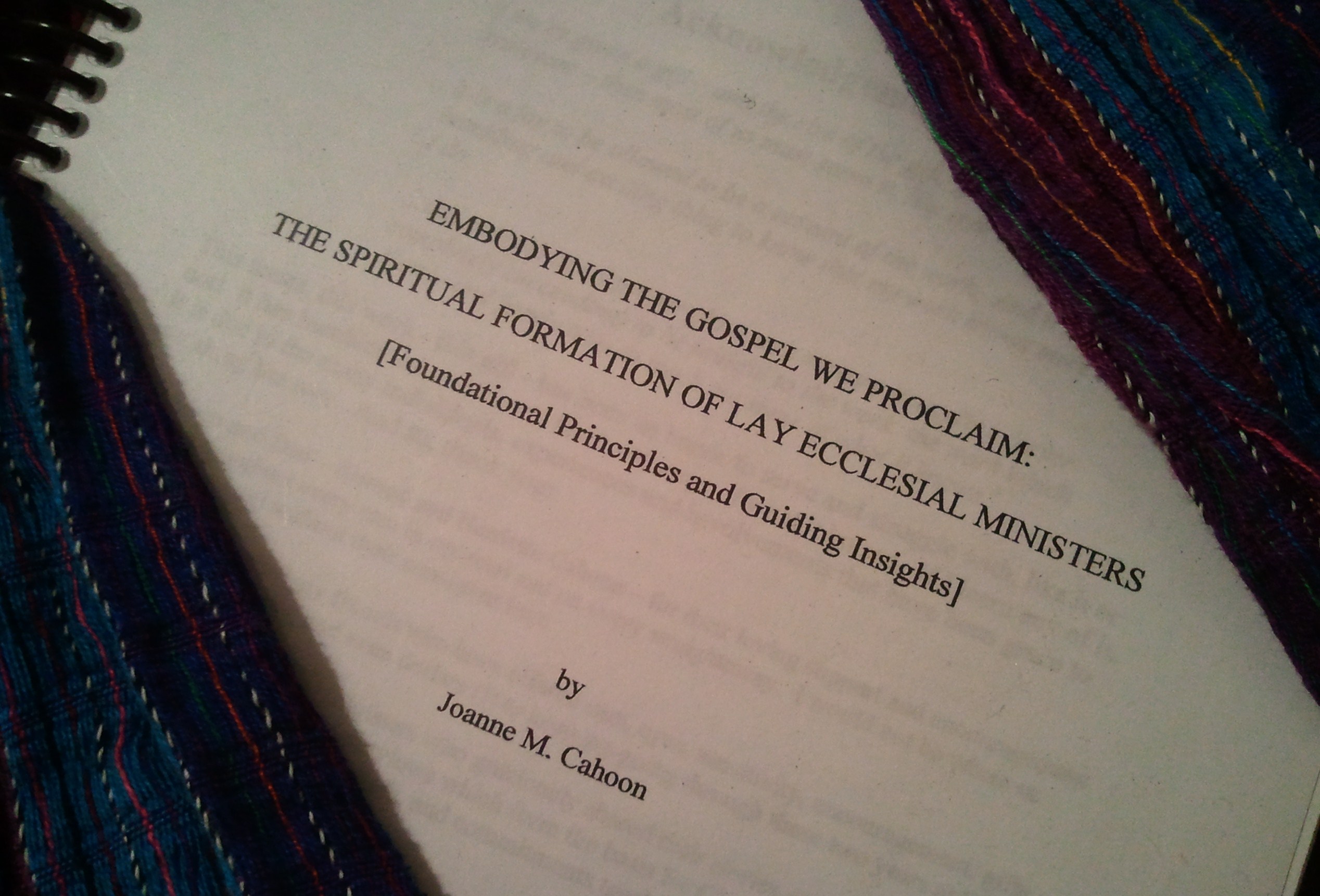 In a stable Mary holds her infant son, and wonders at his crying. The story tells of shepherds, of wise men/kings, of angels and Glorias, the Star, and of celebrating on the part of all the human witnesses. And Jesus cries, as all babes do – and Mary must have listened – aware of her son, aware of this son – and pondered the mystery. God takes on human flesh. “Mary… is stunned at what the exchange is meaning: while [man] is getting to know joy, God is discovering tears.” *
In a stable Mary holds her infant son, and wonders at his crying. The story tells of shepherds, of wise men/kings, of angels and Glorias, the Star, and of celebrating on the part of all the human witnesses. And Jesus cries, as all babes do – and Mary must have listened – aware of her son, aware of this son – and pondered the mystery. God takes on human flesh. “Mary… is stunned at what the exchange is meaning: while [man] is getting to know joy, God is discovering tears.” *
What has this to do with Lent? It’s the Christmas story. But we know that incarnation and self-donation and presence and cross and resurrection are all of a piece. As one Advent hymn lyrically captures 2 Corinthians 8: “He became poor, that we might be rich: Flesh of our flesh and bone of our bone”. God’s great desire to be one with us creates the salvation we so long for, and the way home. God’s desire for us and this salvation are quite literally way and truth and life to us in the here and now. God, willing to enter tears and joy and all humanity, redefines love. With Gospel eyes, we can’t miss this love in Jesus. If only we take off our too-familiar-with-the-stories presuppositions and perspectives. This is where seeing like children (as Jesus often encourages), with fresh wonder, is essential.
What if we ask to have the scales fall from our older eyes so that we might truly see the following?
Faith means literally to set one’s heart by (as has been explored in pre-Lent posts): and we are not the only or the first ones to set our hearts. God is faithfulness, God doesn’t do faithfulness. God’s heart is always being set.  In Trinity, we know the Father, Son and Spirit set their hearts on one another and pour out all unceasingly. This Trinitarian God desires the same kind of communion with us. It is God, therefore, who “faiths” first: God sets God’s heart on us! God believes in us. Why? That question makes no sense to love, which needs no reason – it is in essence always free.
In Trinity, we know the Father, Son and Spirit set their hearts on one another and pour out all unceasingly. This Trinitarian God desires the same kind of communion with us. It is God, therefore, who “faiths” first: God sets God’s heart on us! God believes in us. Why? That question makes no sense to love, which needs no reason – it is in essence always free.
God enters all of our reality to save us from the inside out. WITH is then not only Emmanuel’s translation (God is with us), but our greatest peace. We are never ever alone, whatever our circumstances and the feelings and thoughts that connect with them. We can, in trust, cast all our cares on God who cares for us (1 Peter 5). Why? Again, because our very identity is found in being God’s Beloved Ones who have God WITH, always: a loving, humble God who finds it delightful to accompany us at every moment of our journey.
This Lent, perhaps what bears reflection is this WITH-ness of God, who always sets his heart first on us. All we do is response and grace. In response, you and I who know ourselves as desired disciples can follow the One – Jesus. He showed us what love really is in his WITH-ness with us. This Lent, we can practice and claim more as our own the disciple’s discipline of WITH-ness too. God’s WITH-ness, born of love, is witness to us! 🙂
When you and I practice WITH, we have come in church documents to call it solidarity – a presence with another or others that is acting according to our connection one with each other. It is a living in response to the fact that we are all one community, one body, one communion. There is a special quality of God’s presence to us, as seen in the life of Jesus, that we might practice most deliberately in our own circumstances this Lent.
Let me describe it with an image. If my arm hurts, as it has the last few days, the rest of me is compensating. I make adjustments, reach and twist and sleep and even walk differently. Something has been pulled and needs perhaps rest, perhaps good stretching. I am mindful of it.
In the Gospels we see that Jesus walked among hills, near the sea, in villages and through crowds. And his attention was often drawn to the “hurting limb”: the paralytic lifted through the ceiling, the blind man on the side of the road, the woman with a long debilitating hemmorhage, the lepers who knew no home, the bent over woman living on the edges of the temple, the widow who had lost her son, the Samaritan, the Canaanite, the sinner, the poor. As naturally as my attention goes to my arm due to its soreness, Jesus was drawn to be especially WITH individuals most in need.
We learn from Jesus’ living that God delights in being WITH all of us, but particularly chooses to be WITH those of us, and those parts of us, most hurting – whether that hurt is seen by others or not. Since such vulnerability merits God’s special presence and nurturing, healing attention; it merits ours. Is this the preferential option for whoever is poor? Perhaps. And why wouldn’t we want to be WITH in love in the same way the One who saves us shows us? The way the One who loves us has and is WITH us.
Therese of Lisieux said at the end of her life that she would spend heaven doing good upon the earth. She had great desire for other souls’ good during her life, and she wished to keep up this work after her death. In this, she was very interested in the same things that interest her Love, the One who desired and saved her and was WITH her. But this was a way she grew into.  She, more than many, told us through her autobiography of her struggles to look beyond herself to be servant and companion to those she found difficult. Her ‘little sacrifices’ were nothing other than disciplines that helped her get out from her own thinking about her and into the ability to be WITH the other. She did not assume she knew the heart of another, nor did she need to. She simply served and chose the discipline to see the other and act in gentleness and compassion, with much prayer, and in small ways, as she could. These small disciplines, her “little way”, changed her, shaping her desires. We call her saint. More importantly, they were expressions of love in the same pattern as Jesus’ love, and so they were life-giving to the other.
She, more than many, told us through her autobiography of her struggles to look beyond herself to be servant and companion to those she found difficult. Her ‘little sacrifices’ were nothing other than disciplines that helped her get out from her own thinking about her and into the ability to be WITH the other. She did not assume she knew the heart of another, nor did she need to. She simply served and chose the discipline to see the other and act in gentleness and compassion, with much prayer, and in small ways, as she could. These small disciplines, her “little way”, changed her, shaping her desires. We call her saint. More importantly, they were expressions of love in the same pattern as Jesus’ love, and so they were life-giving to the other.
The being present to the part of the body that hurts, to the person who annoys, to the challenge that discomforts us – these are not easy things. In each of our lives these movements may be expressed differently (and different days offer different opportunities – even different hours or moments!). But what if you and I attempted to do this to be united with a loving, desiring God who wants all to know joy? What if we practiced choosing in moments a union with a God who chooses to discover tears in entering humanity — and will choose so much more of our limits and struggles too?
This is not an invitation to beat ourselves up over our own struggles to love. Practicing makes perfect. It’s about bringing a willingness and a hope to be WITH, and trusting grace to help us see and act bit by bit. It is an invitation to plant small seeds, to follow little ways (like Therese), to see with Gospel fresh eyes, and to count on God’s mercy to help us as we depend on others to support our growing too.
What of acting for the hurting this Lent in some way? Political action on behalf of the vulnerable? Looking out for children without sufficient adult support in your circle? Serving the homeless, or the out of work neighbor, with kindness and respect as well as physical support? Volunteering at a hotline? Training with your pet to visit the elderly? Planting flowers for an elderly relative or neighbor? Being mindful of those in your circle with decreased mobility who may need driving to appointments or shopping? Looking into the eyes with an intention of good of those we don’t know how to serve who ask for money? Carrying granola or fruit bars in our car to give out instead of money at city street corners? Contributing our unique skills for someone else’s good? The HOW of this is limited only by our imaginations, let’s broaden them and brainstorm possibilities – perhaps with each other here, or with friends or family, or in small faith communities!
What we choose may not be large or take much time. But it is a choosing to act in accord with the FACT that we are WITH others with needs in the communion of love that God establishes because we are family in him. It may be a hospitality too to some hurting part of ourselves, and seeking the care and mercy and support and forgiveness and gentleness we need on our own journeys.
Whatever you and I do, it is good to remember that it is not to earn or achieve some illusion of ‘now we’re being good people’. It is as simple as my attention to my overworked arm. It is appropriate care to a need in our family/in our communion, and we are inspired to it by the life of Jesus which expresses the love and desire of God for us.
Let us again learn to set our hearts. And perhaps we can pray and consider our call to be faithful as God is faithful. In this is a living in our true identity, not a spiritual fix-it project to be a better person this Lent.
Let our eyes see your willing entering of our tears, O Lord. Comfort us. And train us as we choose to practice loving as you love, in being WITH. Care for those most in need, O God, and make us partners in this presence that is healing and saving and life.
* Iaian Matthew on John of the Cross, Ballad seven in The Impact of God: Soundings from St. John of the Cross











